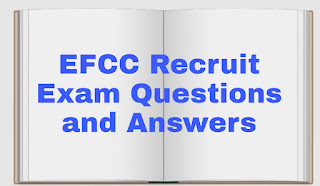EFCC Recruit Exam Questions and Answers
Here are the frequently asked questions and answers about the Economic and Financial Crimes Commission (EFCC):
Q: What is the EFCC?
A: The EFCC is the Economic and Financial Crimes Commission, a law enforcement agency in Nigeria responsible for investigating and prosecuting economic and financial crimes.
Q: When was the EFCC established?
A: The EFCC was established on April 3, 2003.
Q: What are some of the core functions of the EFCC?
A: The core functions of the EFCC include investigating financial crimes, enforcing anti-money laundering laws, combating cybercrime, and recovering proceeds of financial crimes.
Q: Who can be investigated by the EFCC?
A: The EFCC can investigate individuals, organizations, government officials, and any person suspected of engaging in economic and financial crimes.
Q: What are some examples of economic and financial crimes?
A: Economic and financial crimes include fraud, money laundering, bribery, corruption, embezzlement, cybercrime, and other illegal activities that involve financial transactions.
Q: Can the EFCC arrest and prosecute suspects?
A: Yes, the EFCC has the authority to arrest and prosecute suspects involved in economic and financial crimes.
Q: How does the EFCC carry out its investigations?
A: The EFCC conducts investigations through various means, such as gathering intelligence, analyzing financial records, conducting surveillance, and collaborating with other law enforcement agencies.
Q: Can the EFCC freeze bank accounts?
A: Yes, the EFCC has the power to freeze bank accounts if there is evidence of financial crimes or suspected illicit transactions.
Q: What happens to assets seized by the EFCC?
A: Seized assets are managed by the EFCC and may be used as evidence in criminal proceedings. Upon conviction, the assets may be forfeited to the government or returned to victims.
Q: Can the EFCC investigate international financial crimes?
A: Yes, the EFCC collaborates with international law enforcement agencies to investigate and combat transnational economic and financial crimes.
Q: Does the EFCC have the power to grant bail?
A: No, the EFCC does not have the power to grant bail. However, suspects can apply for bail through the appropriate courts.
Q: Can the EFCC prosecute cases without evidence?
A: No, the EFCC must gather sufficient evidence before prosecuting a case. They follow due process and present evidence in court to establish guilt.
Q: Are EFCC investigations always successful?
A: Not all investigations lead to convictions. The success of an EFCC investigation depends on factors such as the strength of evidence, cooperation of witnesses, and judicial processes.
Q: Can the EFCC investigate cases reported by individuals?
A: Yes, the EFCC encourages members of the public to report cases of economic and financial crimes. They have dedicated channels for reporting complaints and whistleblowing.
Q: How can I report a case to the EFCC?
A: You can report a case to the EFCC by visiting their website, contacting their hotline, or visiting their offices in person to provide information about the crime.
Q: Can the EFCC investigate public officials?
A: Yes, the EFCC has the mandate to investigate and prosecute public officials suspected of engaging in economic and financial crimes, including corruption.
Q: What penalties can be imposed for economic and financial crimes?
A: Penalties for economic and financial crimes vary depending on the nature and severity of the offense. They can include fines, imprisonment, asset forfeiture, and other punitive measures.
Q: Does the EFCC have prosecutorial powers?
A: Yes, the EFCC has the power to prosecute cases in court. They work closely with the Office of the Attorney General of the Federation to initiate legal proceedings.
Q: Does the EFCC focus only on high-profile cases?
A: No, while the EFCC does handle high-profile cases, they also investigate and prosecute cases of economic and financial crimes at various levels, including individuals and organizations.
Q: Is the EFCC independent?
A: The EFCC is an independent law enforcement agency. However, it operates under the supervision of the Office of the Attorney General of the Federation and is subject to legal and regulatory oversight.
Q: Does the EFCC recover stolen funds?
A: Yes, one of the key objectives of the EFCC is to recover proceeds of economic and financial crimes. They work to trace, confiscate, and repatriate stolen funds both within Nigeria and internationally.
Q: Can the EFCC investigate cases that occurred before its establishment?
A: Yes, the EFCC has the authority to investigate and prosecute cases of economic and financial crimes that occurred prior to its establishment, as long as the offenses fall within the scope of their mandate.
Q: Does the EFCC provide protection for whistleblowers?
A: Yes, the EFCC has a Whistleblower Policy that ensures the protection and confidentiality of whistleblowers who provide credible information about economic and financial crimes.
Q: Can the EFCC operate outside Nigeria?
A: The EFCC primarily operates within Nigeria. However, they collaborate with international law enforcement agencies and may seek assistance in investigating cases that have international dimensions.
Q: Can the EFCC investigate non-Nigerian citizens?
A: Yes, the EFCC can investigate non-Nigerian citizens if they are suspected of engaging in economic and financial crimes within Nigeria's jurisdiction.
Q: Is the EFCC subject to external oversight?
A: Yes, the EFCC is subject to oversight by the National Assembly, the judiciary, and other relevant oversight bodies to ensure accountability and adherence to the law.
Q: Can the EFCC recover assets from convicted individuals outside Nigeria?
A: Yes, the EFCC can work with international partners to trace and recover assets located outside Nigeria if they are believed to be proceeds of economic and financial crimes.

Post a Comment